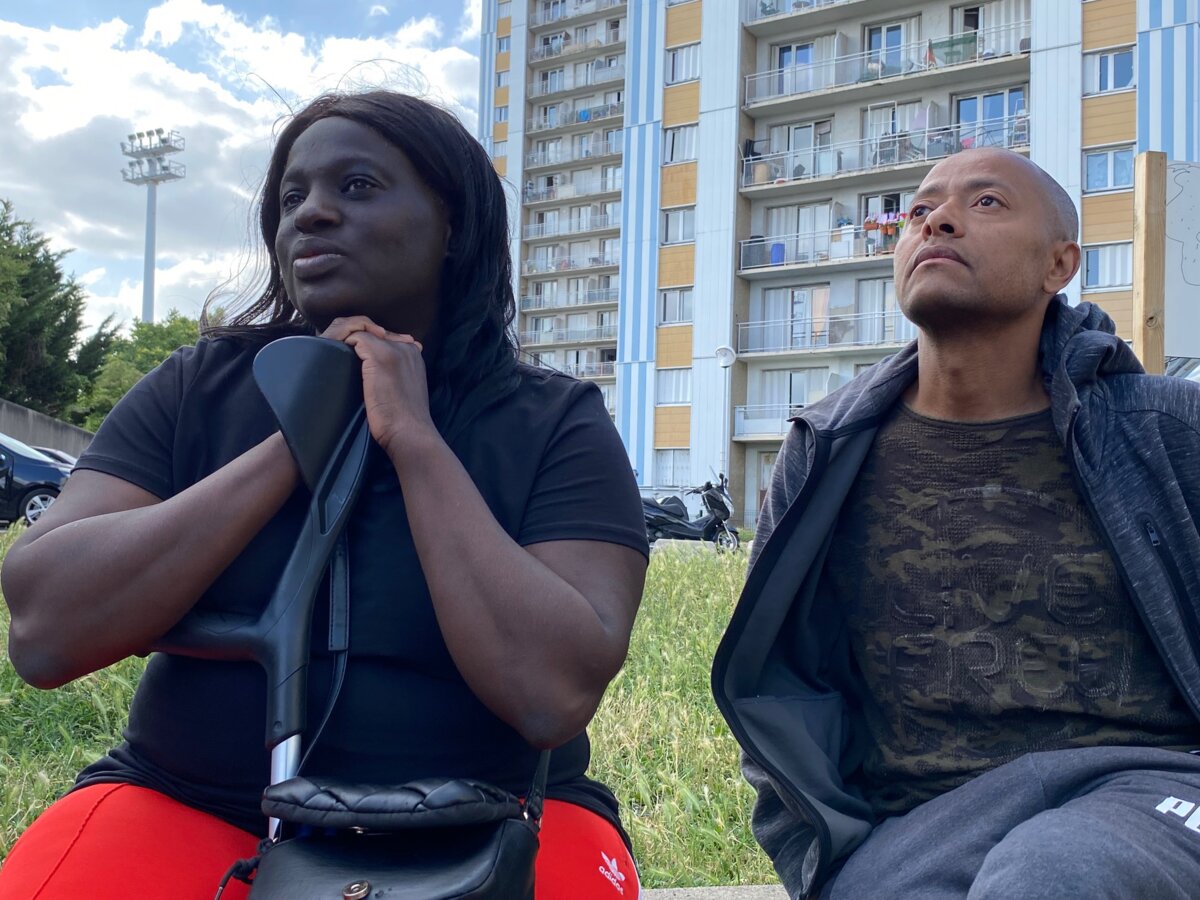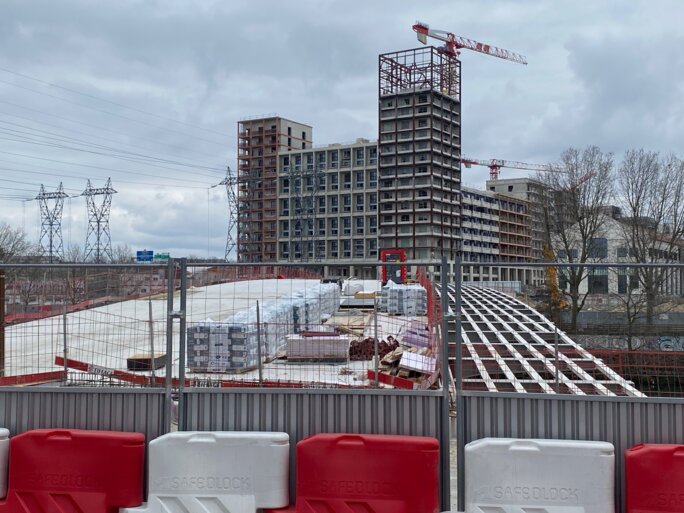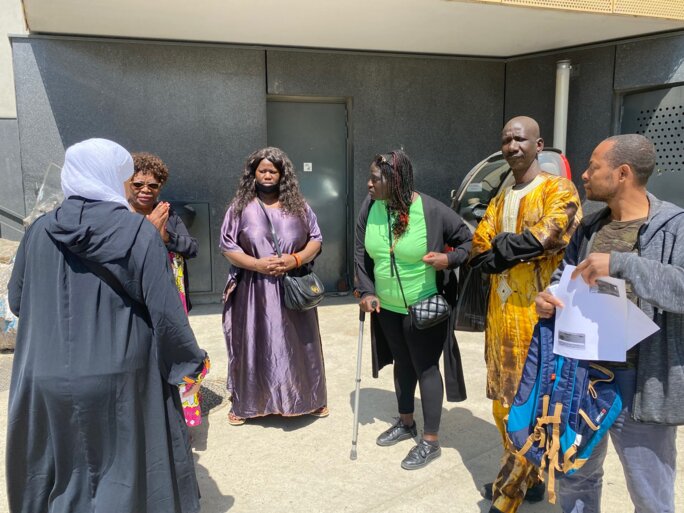One family has been offered an apartment which has holes in the floor and peeling walls. Or alternatively a maisonette with a staircase that is dangerous for their 14-month-old girl. Or, failing that, a three-bedroom apartment that costs more per square metre than their current home, and this despite having a mouldy wall.
Then there is the family of seven who currently rent a small, mould-ridden apartment that they want to leave as soon as they can but who find themselves in an impasse after rejecting a series of unattractive alternatives: these have been too far away; too far away and very rundown; or too expensive and on an estate known for drug dealing. As it is, their current high-rise estate has already been identified by the police as a centre of dealing, where drugs are sold openly and hidden in false ceilings in the main entrances to the tower blocks.
These types of offers of alternative accommodation, which have recently been made to the residents of the Marcel-Paul high-rise estate at Île-Saint-Denis in the northern suburbs of Paris, are in fact outside the normal rules that govern rehousing during urban renewal operations. These rules, set by legislation that dates from 1948, prevent tenants being asked to move more than five kilometres (just over three miles) from their current home if they do not want to. The rules also state that those carrying out the rehousing should seek to ensure that households do not end up paying more per square metre for their accommodation. And as the national urban renovation agency the Agence Nationale de Rénovation Urbaine (ANRU) itself notes, there is a duty to “offer a positive residential experience”.

Enlargement : Illustration 1

ANRU is co-funding a major operation in Île-Saint-Denis: the three 15-storey towers on the Marcel-Paul estate there have to be pulled down. Within a few years a new neighbourhood will be created, one that is less crowded and healthier. Between between now and then the current residents have the right to receive three alternative priority rehousing offers, though this comes at a time when there is huge demand for social housing. That is, for better or worse, the fate of these tenants who under a charter have, in theory, a “right to return”.
But this neighbourhood, on the south of one of the prettiest islands on the River Seine, has a particular issue: its proximity to the future Olympic Village for next year's Paris Games. Is that the reason why the pressure to rehouse them is greater than elsewhere? “It's the first time that I've seen such extreme things,” says François Dubois, a city planner and the member of the association APPUII, which supports residents whose areas are undergoing urban renewal projects.
Hawa Dangnoko, a single mother with four children, was offered alternative housing at Montfermeil, which is around 20 kilometres or 12-and-a-half miles from the Marcel-Paul estate. She refused the offer over the phone. But as Mediapart has seen, the offer was still sent to her in a text message, a sign of the landlord's insistence.
Marina Zoé is happy with the building where she was rehoused in nearby Saint-Denis. But her rent has gone up by 117 euros a month and she is still waiting – as of this month – for the reimbursement of her deposit, which is equivalent to two months rent. Karim Diabaté and his family, meanwhile, had to refuse housing at Pierrefitte, a little over five kilometres or three miles away, because their rent would have jumped from 700 euros to 1,110 euros a month. Their income has been limited since this former lorry driver had to stop work for medical reasons; he now only receives a disability benefit.
Jean-Wilson Lacombe is keen to leave the Marcel-Paul estate. “I don't want my children to grow up in this neighbourhood, it's noisy day and night,” he says. So it was with great reluctance that he turned down a four-bedroom apartment at Les Lilas to the south-east of his current home. It would have cost 753 euros a month – against his current 667 euros – and above all it had a dirty floor, a broken interior wall and was located in an old building. He asked for some work to be done first but this was refused. “They're going to offer it to someone else,” Jean-Wilson Lacombe says.
When approached by Mediapart, social landlords Seine-Saint-Denis Habitat said they would not comment on individual cases. But they stated that “only offers that meet the regulation criteria are officially taken into account”, i.e. as part of a tenant's statutory three offers of alternative accommodation. These criteria are accommodations costs “per habitable square metre that are identical to those of the housing currently occupied” and a new home which is “situated within a maximum range of five kilometres from the area desired by the tenant”.
So why are they offering apartments which clearly do not correspond to these rules at all? Following the regulations “doesn't prevent the making of additional offers in line with availability,” adds Seine-Saint-Denis Habitat. Out of 277 tenants in all, 66 had been rehoused by the beginning of July, leaving 211 still to find acceptable new accommodation.
“You can make offers outside the the rules, there are always some,” says François Dubois from APPUII. “But to suggest that it's that or nothing, that's akin to dishonesty. It's one thing to open up a wider range of possibilities, it's quite another to oblige people to accept it.”
Everyone whom Mediapart met on the estate spoke about pressure from the landlords. “With your income you won't find better”, “it will still be better than here” are the phrases they keep hearing. The Camara family even received a letter acknowledging an agreement they had not accepted. Six families were led to believe that they had to be out before December. The mother of an ill and disabled child says that the landlord explained to her that if she “didn't broaden” her search range then she would “never have” what she wanted because “the tower blocks will be evacuated by the end of the year, we'll get everyone out”. To which her response was: “We may leave - but to go where?”
When approached by Mediapart the Île-Saint-Denis mayor's chief of staff, Victor Drot, said that such talk was just “a rumour” with “no foundation”. He said: “There's no departures fixed for December! It's legally impossible anyway. The rehousing will follow its normal course. We can't force people to leave.”

Enlargement : Illustration 2

The agreement signed between the town hall and ANRU on October 19th 2022 explains that the “progress of major local projects” and in particular “the creation of the Olympic and Paralympic Village” is injecting a “new dynamic and a new timetable into the urban renewal plans”. And that the “geographical proximity of the plans” as well as the “strategic issues of residential diversification and social mixing” mean that it is all connected. The rehousing timetable, which was voted on by the municipal council, envisages that it is completed by December 17th 2023. And that one tower block will have been destroyed by May 2024.
“They're emptying this neighbourhood before the Olympic Games and these residents might not be able to return there,” complains Floréale Mangin, an opposition councillor in the area. That is not the view of the mayor of Île-Saint-Denis, social entrepreneur Mohamed Gnabaly. “The Olympic Games is an opportunity for our residents to have quality housing, housing that they want,” he told a meeting of the municipal council. He denied that they were “prioritising the Games over the residents” or that “we're going to make the residents leave for the Games, that's not true”. He said: “I'm clear about this. Get it into your heads, we're not going down that path at all.” When approached by Mediapart he declined to respond to our questions.
Is this an issue of wording or tone? For during the same council meeting the mayor acknowledged that the rehousing of the Marcel-Paul estate residents was a priority for the authorities. This was what led to them being offered homes across the whole Paris region - and thus lifting the five kilometre rule. “We have got this opportunity - we can say so quite happily - thanks to the Olympic and Paralympic Games, and to the willingness of the state to help us in a project of his scale,” he said.
There is an apparent contradiction here. The residents of the three tower blocks are not being moved out because of the Olympic Games. “No specific request has been made” - either by the organising committee for Paris 2024 or by SOLIDEO, the public body charged with delivering the Olympic building - “concerning the plan for urban renewal and rehousing that you are talking about”, both organisations told Mediapart.
But this mega-event creates its own pressing timetable, a deadline that triggers accelerated action and ever-mounting pressure. The Games are not the reason for the rehousing but they do provide the means for it to take place. And the unforgiving countdown between now and July 2024 is shortening the highly sensitive and delicate moving process. For as ANRU itself says “rehousing is a deeply human affair … It involves leaving an apartment and the life memories that it represents ... It leads to concerns and often the opportunity for a better living environment”.

Enlargement : Illustration 3

The new buildings of the Olympic Village at Île-Saint-Denis and their green surroundings are being built a few hundred metres north of the Marcel-Paul tower blocks, which are not therefore within the physical boundaries of the Games site. But these high-rise blocks tower over the neighbourhood, including the old, majestic Grande Nef de l'Île-des-Vannes sports stadium nearby, which is being refurbished to be used as the athletes' training centre for the Games. So the housing estate is slap bang between the athletes' training track and their future residence.
There is a stark contrast here. On the one hand there is the development of the “quintessence of how we conceive urban areas in France in the 2020s”, according to the head of the Olympic construction projects Nicolas Ferrand, who is director general of SOLIDEO. For after the Games this Olympic Village will become a neighbourhood of innovative housing adapted for climate disruption. Around 50 social housing units could be reserved there for the current tenants of the social housing on Île-Saint-Denis.
On the other hand there are 292 households who now have to leave their homes as soon as possible. That includes parents of children who are going to have to change schools. It also includes Fatima, aged 63, who turned down an apartment at Argenteuil around eight kilometres to the west, because it is too far from the doctor who is treating her eye condition. Then there is the elderly couple who have lived in tower block three since 1982. And the mother of four who does not know how she is going to cope with unpaid debts of 7,000 euros.
“It's a triple whammy: we're being cleared out when good things are happening here, and we're being rehoused too far away and in rubbish places which are even worse than here. Make my apartment like new again and I'll stay!” says Gnama Camara. Her partner, a plumber, suffers from allergic bronchitis and laryngitis “related to an allergy provoked by his mouldy housing environment,” according to a medical certificate.

Enlargement : Illustration 4

The families whom Mediapart met do not understand the rush and say they are all suffering as a result of the pressure from the landlords to accept new housing. As a result they have now formed their own collective. “They want to get rid of us for the Olympic Games,” insists Gnama because “what goes on below is a blot on the landscape”, a reference to the drug dealing. Hawa says: “They don't want to see our faces during the Olympic Games.”
“They don't want us,” adds Marina Zoé angrily. “We're an eyesore. The Parisians are going to come here, and they'll get rid of the poverty to let the trendy middle classes in. We feel abandoned.”
François Dubois points out that “ANRU is a project created to improve the lives of residents”. And that rehousing plans must be drawn up jointly with the people involved. Yet that “hasn't happened here” he says. Despite numerous attempts, Mediapart has been unable to get a response from the state prefecture for the Seine-Saint-Denis département or county which has been closely involved in the case.
One Sunday in July, under a sun that was still warm even though it was late afternoon, Gnama, Karim, Marina, Hawa, Fatima and Jean-Wilson got together next to a children's playground to discuss their issues. Before returning home Karim tried to reassure the troops. “We'll stay together until the last person leaves,” he said.
-----------------------------------------------------------------------
- The original French version of this article can be found here.
English version by Michael Streeter


